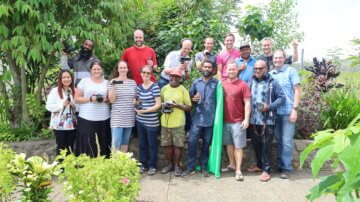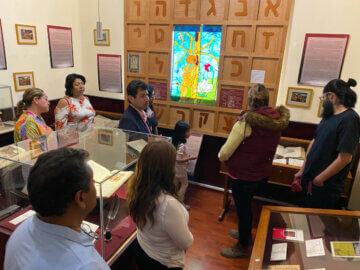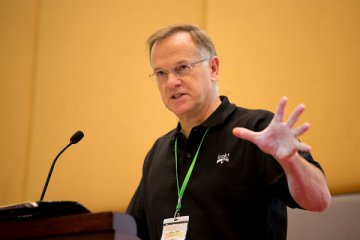The Church and Global Mission
Dr. Chris Wright - Tuesday from Wycliffe Global Alliance on Vimeo.
Tuesday, 8 May 2012: The third of three presentations by Dr. Christopher J.H. Wright to look!2012.
View the first and second presentations: Come in with praise; go out with hope (Sunday, 6 May 2012); Holistic Mission (Monday, 7 May 2012).
Church, Society and Creation
In his second message to look!2012, Dr. Wright built a framework for understanding what ‘holistic mission’ looks like. Scripture reveals that God’s mission encompasses three overarching themes: Building the church (by means of evangelism and teaching), Serving society (by means of justice and compassion) and Caring for creation.
In that message Dr. Wright went on to expand on the first theme, building the church, showing the place and importance of evangelism and teaching—the means of expanding, strengthening and maturing the church—as core mandates of the Great Commission. He reminded us that “it takes a disciple to make a disciple.”
Now, in his third and final message, Dr. Wright turns to the areas of compassion and justice as the expressions of our service to society; and to a fuller biblical understanding of the place of creation care in the full scope of holistic mission.
Serving society: expressed through compassion and justice
When Jesus was about to depart this earth and gave his final instructions to his disciples, he told them (after first reminding them of the authority vested in him by the Father) that they were to go into all the world, make disciples of all nations and, in that endeavor, “teach them to obey all I have commanded you.”
Wright called this expression within Jesus’ Great Commission “pure Deuteronomy.” There was always a powerful emphasis on obedience to God’s commands in the books of Moses, particularly in Deuteronomy. It was not just the following of a set of rules; it was imitating the very nature of God as a God of both justice and compassion. A key passage on this theme is Deuteronomy 10:12-19, which includes a foreshadowing of Jesus’ final instructions: “And now, O Israel, what does the Lord your God ask of you but to fear the Lord your God, to walk in all his ways, to love him, to serve the Lord your God with all your heart and with all your soul, and to observe the Lord’s commands and decrees that I am giving to you today for your own good?” (vs. 12-13, emphasis added).
And what are “his ways”? They clearly include justice and compassion: “For the Lord your God…shows no partiality and accepts no bribes. He defends the cause of the fatherless and the widow, and loves the alien, giving him food and clothing” (vs. 17-18). The passage goes on to say in verse 19 that God’s people should do the same things God does. Wright cites other passages (from among many throughout Scripture) that echo God’s heart in this matter:
- Matt 5:6; 6:33 – “Blessed are those who hunger and thirst for righteousness, for they will be filled;” and “…seek first his kingdom and his righteousness (or justice)….” (Wright noted here that the Hebrew and Aramaic words for ‘righteousness’ and ‘justice’ come from the same root.)
- Matt 23:23 – Jesus speaking to the teachers of the law and Pharisees: “But you have neglected the more important matters of the law—justice, mercy and faithfulness.”
- Micah 6:8 – “And what does the Lord require of you? To act justly and to love mercy and to walk humbly with your God.”
Dr. Wright developed this theme further in his more recent book, The Mission of God’s People, which he calls the “So what?” of his earlier work, The Mission of God. The central theme of the book is captured in the posing of two questions: Who are we (who are we to be)? -and- What are we here for (what are we to do or proclaim)?
There are many examples from Old Testament Scripture that reveal God’s expectations on both aspects—being and doing/proclaiming. Wright cited these passages as examples:
- Genesis 18:19 – Abraham was “to keep the way of the Lord by doing what is right and just.”
- Exodus 19:6 – God’s people were to be holy (set apart; different) and be a “kingdom of priests” in the midst of the nations.
- Leviticus 18:1-5 – God’s people are to be holy as He is holy and to live in such as way as to be distinctive from the nations.
- Deuteronomy 4:6-8 – God’s people are to be visible to the nations in such a way that they will see and ponder who God is and what God is doing in their midst.
Thus, Israel had a mission to be something for the sake of the knowledge of God among the nations. It should be clear, from the above passages and others, that our ‘being’ – who and what we reflect – is an extension of God in us, revealing His own character and values through us to a broken world.
Highlighting a passage from Isaiah 58, Wright said that light shines from people who are committed to compassion and justice. What characterizes this shining light according to Isaiah? If God’s people “loose the chains of injustice…set the oppressed free…share food with the hungry…provide the poor wanderer with shelter…clothe the naked”—“Then your light will break forth like the dawn” (Isaiah 58:6-8). Wright concludes on this passage: “Light was ethical as well as theological.”
These things are echoed and reinforced in the New Testament. Jesus says to his disciples, “You are the light of the world … Let your light shine before men, that they may see your good deeds and glorify your Father in heaven” (Matt 5:14, 16 – emphasis added).
The apostles and the early church were as committed to living in obedience to Jesus’ teachings on serving society, as to preaching about salvation through Jesus:
- Acts 4:32-35 – “…they shared everything they had…there were no needy persons among them…money…was distributed to anyone as he had need.”
- Galatians 2:10 – Paul, reflecting on the apostles’ instructions to him: “All they asked was that we should continue to remember the poor, the very thing I was eager to do.”
- Paul’s letter to Titus – Paul, giving instructions on the basis of the grace of salvation received: “And I want you to stress these things, so that those who have trusted in God may be careful to devote themselves to doing what is good” (3:8). Paul repeats the admonition about “doing what is good” numerous times in this letter. In Roman times, one who “did good” was a social benefactor, not just someone who did nice things.
- James 2:14-17 – Using an example of failing to have compassion toward those who are without the basics of life—clothing and food—James says, “…what good is it? ... Faith by itself, if it is not accompanied by action, is dead.”
- 1 John 3:17-18 – “If anyone has material possessions and sees his brother in need but has no pity on him, how can the love of God be in him?”
Citing the work of Wycliffe and SIL in their work of providing Scripture as an example of the outworking of these things, Wright said, “You know perfectly well that, when you give people the gift of a preserved language, a language now written down…and give them status and literacy, you are engaged in a process that has social, political and economic impact and results … because you are affirming the dignity of every language and culture and ethne. You are saying, ‘everybody matters, everybody counts.’ You are building on the biblical truth … that God created ethnic diversity, and loves it, and wants to affirm the dignity of every language and tribe, people and nation.”
Caring for creation
As a preamble to his Great Commission to his Church, Jesus said, “All authority in heaven and on earth has been given to me” (Matt 28:18 – emphasis added). In saying this, Jesus is once again hearkening back to ancient truth as expressed in Deuteronomy: “Acknowledge and take to heart this day that the Lord is God in heaven above and on earth below. There is no other” (Deut 4:39).
But what are the implications of this – that he has all authority “on earth”? After all, he is about to depart this earth!
Paul, in his letter to the Colossians, gives us a powerful and clear statement about the role of Christ in creation (1:15-20). He tells us that “…all things were created by him and for him…and in him all things hold together” (vs. 16-17). Further, “…God was pleased to have all his fullness dwell in him and through him to reconcile to himself all things, whether things on earth or things in heaven…” (vs. 19-20). The entire universe was created, is sustained, and will be redeemed by Christ. In short, since Jesus is Lord of all creation, including the earth, we are to care for and about it.
Wright asked: Why is it, that there is so much neglect of this truth among evangelicals? It’s because of a defective theology of creation itself. It’s almost as if our Bibles began with Genesis 3 and ended with Revelation 20. But the Bible begins with Genesis 1 and 2, and ends with Revelation 21 and 22; it begins with creation and ends with the new creation. So a whole theology of redemption must include creation. What does God say about his creation?
The goodness of creation
First, creation is good in relation to God:
- It belongs to God (Deut 10:14; Ps 24:1)
- It reveals God (Ps 19; Ps 50:6; Acts 14:17; Rom 1:20)
- It has intrinsic value; it is valued by God (Gen 1:31)
Second, creation is good in relation to us:
- Humans are made in God’s image to rule in God’s way (Gen 1:26-28; Ps 145)
- Humans were placed in the garden to serve and to keep it (Gen 2:15)
The glory of creation
Creation exists to give glory to God and for mutual enjoyment – God in his creation and creation praising God:
- God’s glory through the praise of creation (Psalms 145, 148, 150; Rev 5:13)
- God’s glory in the fullness of creation (Ps 104:31; Isaiah 6:3). It needs to be noted here, that we are not talking about pantheism, since Scripture tells us, “You have set your glory above the heavens.” God is both outside of and ruler over his own creation.
- Therefore, given these truths about the relationship between God and his creation, whatever destroys creation diminishes the praise and glory of God.
The goal of creation
All creation is included in God’s plan of redemption (because creation needs redemption):
- There will be a new heaven and a new earth (Isaiah 65:17-25)
- All of creation will rejoice when the Lord reigns (Ps 96:10-13)
- Creation will be liberated from the bondage of decay (Rom 8:18-21)
- Creation will be reconciled to God through the cross (Col 1:20)
- Creation will be purged, not obliterated (2 Peter 3:10-13)
All of this, Wright observed, reveals that the prophets “included ecology in their eschatology.”
Finally, humanity itself has a final destination when all these things have been accomplished:
- Our destination is not just ‘heaven,’ but life in a new creation; there is a new heaven and a new earth; God will come down – He will come here and dwell among us in this new creation (Rev 21:1-4).
- The glory of all human languages and cultures will be purged and purified, and then brought into the City of God (Rev 7:9; 21:24-26).
So what?
What are the implications of all this, for the Church and its mission? Should everyone be trying to do everything? What happens when things become difficult, when results are not as expected? Dr. Wright concludes his presentation on Holistic Mission and The Church and Global Mission with some key reminders:
- God’s whole mission is for God’s whole Church. No one is exempt. Dr. Wright said it in a memorable way: “To say ‘missional church’ is like saying ‘female woman.’ If it isn’t female, it isn’t a woman; if it isn’t missional, it isn’t the church.”
- The whole church’s mission includes every individual member and the whole of everyday life. Specialization is okay. But it isn’t compartmentalized into false dichotomies of ‘sacred/secular’ or ‘mission/non-mission.’
- The activities of mission can have unpredictable, ambiguous results because we live in a fallen world. Fields of wheat invariably grow weeds as well. That’s okay. Our job is to remain faithful while remaining secure in the knowledge that God is sovereign.
Dr. Christopher J.H. Wright (Ph.D., Cambridge) is director of Langham Partnership International (John Stott Ministries). An ordained Anglican minister, he is also the author of many books, including "The Mission of God: Unlocking the Bible's Grand Narrative."
The latest
View all articles
03/2024 Pacific: Papua New Guinea
Informing, teaching, inspiring: PNG workshop teaches video storytelling for language communities
PNG workshop teaches video storytelling for language communities
Read more
02/2024 Global
Looking ahead at 2024
As the year unfolds, we marvel at the work of God in our rapidly changing world. And, we look forward to a number of gatherings and conversations intended to draw us together.
Read more
01/2024 Americas
Telling the Bible's Story
It may come as a surprise that a museum is among the Wycliffe Global Alliance organisations.
Read more
